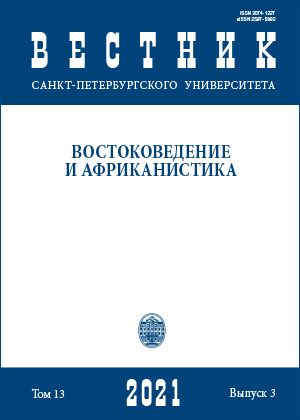Nuri Şeker: The “Second” Sugar King of Turkey
DOI:
https://doi.org/10.21638/spbu13.2021.303Abstract
The article is devoted to the life and work of one of the first Turkish entrepreneurs of the Republican period — Mollazade Nuri Şeker. The source base of the research was made up of biographical and autobiographical materials published in a collective monograph by Turkish researchers dedicated to the development of entrepreneurship and labor movement in Turkey in the first half of the 20th century. Nuri Şeker’s main field of activity was the production of sugar — a product that the country experienced a shortage of during the Ottoman period. At the turn of the 19th — 20th centuries, sugar was the main import of Ottoman Turkey. At the same period of time, the first attempts to solve this problem were made. However, a series of wars in the second decade of the 20th century prevented this. During the national liberation struggle the shortage of this product began to be felt especially acutely. After the proclamation of the Republic, the issue of developing its own sugar production was decided at the state level. Nuri Şeker was a pioneer in this area. He managed to establish sugar production from scratch: from the cultivation of sugar beets, which were not produced in Turkey at that time, to the crystallization of sugar and he was able to fulfill a dream that had haunted him since childhood. However, despite unconditional success in his entrepreneurial activity, Nuri Şeker could not surpass his only competitor at that time — Şakir-bey (the creator of the sugar factory in Alpullu) who enjoyed the full support of the government. In addition to Nuri Şeker’s professional activities, the article also discusses his personal qualities that aided him in achieving success.
Keywords:
Turkey, economy, entrepreneurs, Nuri Şeker, sugar industry
Downloads
References
Downloads
Published
How to Cite
Issue
Section
License
Articles of "Vestnik of Saint Petersburg University. Asian and African Studies" are open access distributed under the terms of the License Agreement with Saint Petersburg State University, which permits to the authors unrestricted distribution and self-archiving free of charge.





